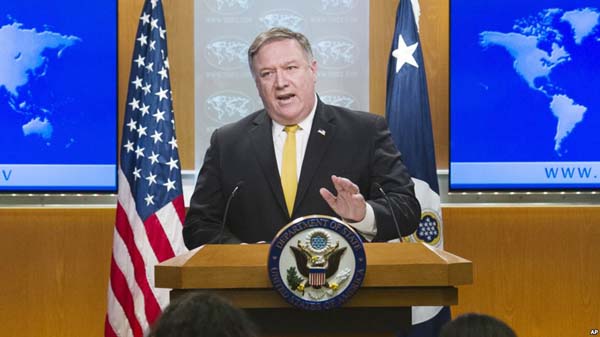
AFP, Seoul :
U.S. Secretary of State Mike Pompeo arrived in Seoul Sunday, after his fourth visit to North Korea where he met with Kim Jong Un.
The leader of the isolated country was heard saying to the top U.S. diplomat, “I am really pleased for this opportunity.After having a nice meeting, we can enjoy a meal together.”
Shortly after arriving in South Korea from North Korea, Pompeo posted a photo of himself walking along with Kim on Twitter:
A U.S. official in Pompeo’s delegation said the trip to North Korea was “better than the last time” but further efforts were needed.
The official indicated some progress was made during the visit, which included a meeting with the North Korean leader, but added: “It’s going to be a long haul.”
Pompeo is scheduled to meet with South Korean President Moon Jae-in and Foreign Minister Kan Kyung-wha to brief them on his meeting with Kim Jong Un.
Pompeo had said the goal of his meeting with North Korea was “to make sure we understand what each side is truly trying to achieve … and how we can deliver against the commitments that were made” in Singapore where Kim and U.S. President Donald Trump held their historic summit earlier this year.
He had also said he wanted to pin down a date for a second summit between Kim and Trump. It was not immediately clear if that goal had been reached.
On the first leg of Pompeo’s three-day tour of East Asia, he met Saturday with Japanese Prime Minister Shinzo Abe and Foreign Minister Taro Kono about North Korea.
Pompeo said it is important for the two allies to have a “fully coordinated, unified view of how to proceed, which will be what is needed if we are going to be successful on denuclearizing North Korea.”
Abe said he thinks that their talks demonstrate to the world that the alliance between Japan and the U.S. is “more robust than ever.”
After Pompeo’s stop in South Korea, he will visit China before heading home.
The Beijing visit could be tense as it comes days after U.S. Vice President Mike Pence delivered a blistering speech accusing China of military aggression, commercial theft, rising human rights violations and electoral intervention against Trump.

